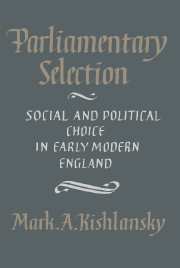2 - Counties and Boroughs
from PART I - SELECTIONS AND SOCIAL CHOICE
Published online by Cambridge University Press: 22 September 2009
Summary
Just as the summoning of Parliament was occasional and intermittent, selections to the House of Commons were an unplanned part of a wider range of social and political choices made in local communities. Assembled together, members of Parliament acquired symbolic importance in uniting the King with his Lords and Commons. They also exercised legal and political functions and represented the community of the realm. They were part of an ongoing institution that was increasingly a part of royal government in the early modern era. Thus it is often assumed that members were individually suited to their collective responsibilities and that this was a result of the process by which they were selected. In fact, there is little that connects the selection process in the localities with the legislative process at Westminster. Parliamentary selections were part of a kind of social ecology in which elevations to titles and honors, appointments to the bench, the lieutenancy, or the assumption of corporate responsibility marked out the thriving species. They were subject to the inexorable laws of the life cycle and the land market – hostages alike to fortunes won and lost, ambitions grasped and dashed. Their determinants varied in place and time and conformed only to the everchanging patterns of local leadership and social differentiation.
The normative process of parliamentary selection must be studied in this context of social standing and community service. Selection of members to Parliament could present the opportunity to honor natural leaders or could highlight ambiguities in the competition for local prestige. The moment of selection was the ever present uncertainty.
- Type
- Chapter
- Information
- Parliamentary SelectionSocial and Political Choice in Early Modern England, pp. 22 - 48Publisher: Cambridge University PressPrint publication year: 1986



